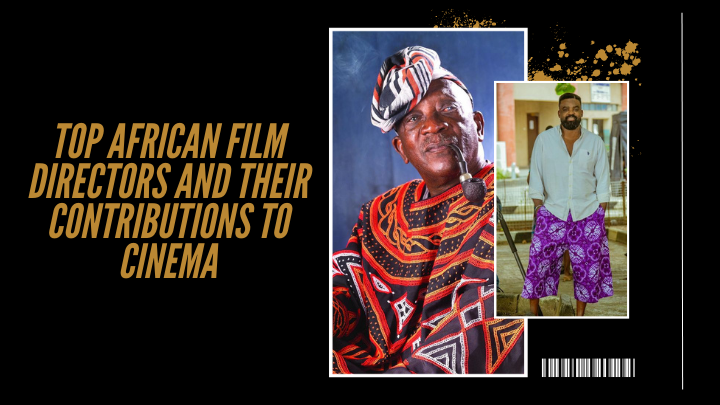African Film Directors
African cinema has undergone a profound transformation over the past several decades, with directors from the continent challenging global perceptions and telling stories that reflect the diverse cultures, histories, and social realities of Africa. From the early days of post-colonial filmmaking to the rise of modern African cinema, directors have become instrumental in creating films that not only entertain but also provoke thought, question norms, and engage in critical dialogue. In this article, we explore the work of some of Africa’s top film directors, including Kunle Afolayan, Wanuri Kahiu, and Ousmane Sembène, whose contributions to cinema have had a lasting impact both on the continent and globally.
1. Ousmane Sembène: The Father of African Cinema
Often referred to as the “father of African cinema,” Ousmane Sembène was a pioneer whose work laid the foundation for modern African filmmaking. Born in Senegal in 1923, Sembène initially worked as a writer before transitioning into filmmaking in the 1960s. His films explored themes of colonialism, independence, social justice, and the complexities of African identity.
Sembène’s landmark film, Black Girl (1966), was a pivotal moment in African cinema. The film tells the story of a young Senegalese woman who moves to France to work as a maid, only to experience isolation and exploitation. It is widely regarded as one of the first African films to gain international recognition, making a bold statement about the effects of colonialism and the struggles of African women in a post-colonial world.
Sembène’s films often portrayed the harsh realities of post-independence African society and were unapologetically political. His film Xala (1975) critiqued the failures of African leaders and the corruption that plagued many newly independent nations. Moolaadé (2004), his final film, tackled the issue of female circumcision and gave a voice to women’s resistance against harmful traditions.
Sembène's work continues to inspire filmmakers and activists around the world, and his contributions to African cinema are indispensable in understanding the intersection of film, politics, and culture in Africa.
2. Kunle Afolayan: Modern Nigerian Cinema and Global Recognition
Kunle Afolayan is one of the most prominent figures in contemporary Nigerian cinema, known for his ability to blend traditional African storytelling with modern cinematic techniques. As a director, producer, and actor, Afolayan has become synonymous with the growth and international recognition of Nollywood, the Nigerian film industry.
Afolayan’s breakthrough film, Figurine (2009), received widespread acclaim for its innovative storytelling and high production values. The film, which blends Nigerian folklore with a modern-day thriller, helped establish Afolayan as a key player in the emerging “new wave” of Nigerian cinema. His ability to create visually stunning films with rich narratives that touch on themes of superstition, family, and destiny has earned him a dedicated following both in Nigeria and abroad.
In addition to Figurine, Afolayan’s Phone Swap (2016) was another significant success. The romantic comedy, which follows two strangers who accidentally swap phones, became a box office hit and further solidified Afolayan’s reputation as a director capable of telling compelling, universally relatable stories.
Afolayan’s contributions extend beyond filmmaking. He is a staunch advocate for elevating the Nigerian film industry by focusing on quality production, creative storytelling, and pushing for greater industry professionalism. Through his production company, Afolayan is working to mentor young filmmakers and provide opportunities for new voices in Nollywood.
His efforts have not gone unnoticed, as his films have been featured in international film festivals and have earned recognition from global audiences, further solidifying Nigeria’s place on the world cinema map.
3. Wanuri Kahiu: Pioneering Kenyan Cinema and Breaking Boundaries
Wanuri Kahiu is a trailblazer in Kenyan cinema and one of the leading voices in African filmmaking. Known for her distinctive storytelling style and commitment to exploring complex narratives, Kahiu has brought fresh perspectives to African cinema, particularly through her focus on contemporary themes and LGBTQ+ issues.
Kahiu’s most notable work, Rafiki (2018), made waves internationally for its unapologetic portrayal of a same-sex love story set in Nairobi. The film, based on the short story Jambula Tree by Monica Arac de Nyeko, tells the story of two young women, Kena and Ziki, who fall in love despite the societal and cultural barriers they face in their conservative Kenyan community. Rafiki was initially banned in Kenya due to its depiction of LGBTQ+ themes but went on to be screened at the Cannes Film Festival, where it received praise for its boldness and exploration of identity, love, and freedom.
Wanuri Kahiu's work goes beyond just breaking taboos; it offers a nuanced look at life in Kenya, particularly the challenges of growing up in a rapidly changing society. Her films are often infused with vibrant visuals, a celebration of African culture, and an exploration of the complex intersection between tradition and modernity.
Through her work, Kahiu has helped create space for diverse voices and stories in African cinema, empowering filmmakers to tackle important social issues and challenge norms. As one of the few female African directors to achieve international recognition, Kahiu’s success has opened doors for other women in the industry, and she continues to be a role model for aspiring filmmakers.
4. Other Notable African Directors Making an Impact
While Sembène, Afolayan, and Kahiu are three of the most widely recognized African directors, they are part of a broader movement of filmmakers who are pushing the boundaries of African cinema. Directors like Abderrahmane Sissako (Mauritania), who gained international acclaim with his film Timbuktu (2014), and Mati Diop (Senegal/France), whose Atlantics (2019) won the Grand Prix at the Cannes Film Festival, are also contributing significantly to the growth of African cinema.
Abderrahmane Sissako is celebrated for his poignant storytelling and his ability to depict African stories with universal relevance. His films often explore themes of war, identity, and the challenges of modern African life. Timbuktu, which explores the impact of Islamic extremism on the people of Mali, was widely praised for its delicate and humanistic portrayal of a complex issue.
Mati Diop is one of the leading female directors in African cinema today. Her film Atlantics, which tells the story of a young woman whose fiancé is lost at sea while migrating to Europe, was lauded for its exploration of themes like migration, love, and loss, as well as its stunning cinematography. Diop's work represents a new wave of African directors who are redefining the narrative of African cinema on the global stage.
The Growing Influence of African Directors
The contributions of directors like Ousmane Sembène, Kunle Afolayan, and Wanuri Kahiu are just a few examples of how African cinema is flourishing. These directors have not only shaped the cultural landscape of their respective countries but have also had a profound impact on global cinema. Their ability to tell authentic African stories, push boundaries, and engage with complex social and political issues has cemented their place in film history.
As African cinema continues to grow, more directors are emerging with fresh perspectives, bringing new stories and voices to the forefront. The global recognition of African filmmakers is a testament to the power of cinema as a medium for cultural exchange and storytelling, and it is clear that the influence of African directors will continue to resonate worldwide for years to come.



